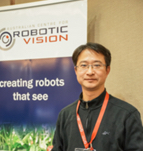Dense 3D Shape Reconstruction of Complex Dynamic Scene with a Single Monocular Camera
Abstract: In this talk, I will describe our recent work (presented at ICCV 2017) on monocular camera based 3D geometry reconstruction of a non-rigid dynamic scene. We aim to answer an open question in multi-view geometry, namely, "Is it possible to recover the 3D structure of a complex dynamic environment from two image frames captured by [...]
Learning to Visually Reason
Abstract: Visual reasoning is a core capability of artificial intelligence. It is a necessity for effective communication, planning, and for question/answering tasks. In this talk, I discuss some recent explorations into visual reasoning for question/answering, game playing and dialog. I also describe our new reinforcement learning platform ELF; an Extensive, Lightweight and Flexible research platform [...]
Carnegie Mellon University
Data Collection for Screwdriving
Abstract: As the use of robotic manipulation in manufacturing continues to increase, the robustness requirements for fastening operations such as screwdriving increase as well. To investigate the reliability of screwdriving and the diverse failure categories that can arise, we collected a dataset of screwdriving operations and manually classified them into stages and result categories. I [...]
Carnegie Mellon University
Dense Planar-Inertial SLAM for Large Indoor 3D Reconstruction
Abstract Reconstructing the dense 3D models of indoor environments in real-time is key to many robotics applications, such as navigation, inspection, and augmented reality. It is also a challenging problem due to the accumulation of drift, large amount of data, limited computation, and occasional lack of visual features. We develop an RGB-D simultaneous localization and [...]
Carnegie Mellon University
Visual Learning without Exhaustive Supervision
Abstract Machine learning models have led to remarkable progress in visual recognition. A key driving factor for this progress is the abundance of labeled data. Over the years, researchers have spent a lot of effort curating visual data and carefully labeling it. However, moving forward, it seems impossible to annotate the vast amounts of visual [...]
Carnegie Mellon University
Learning with Clusters
Abstract As machine learning becomes more ubiquitous, clustering has evolved from primarily a data analysis tool into an integrated component of complex machine learning systems, including those involving dimensionality reduction, anomaly detection, network analysis, image segmentation and classifying groups of data. With this integration into multi-stage systems comes a need to better understand interactions between [...]
Planning Algorithms for Multi-Robot Active Perception
Abstract A fundamental task of robotic systems is to use on-board sensors and perception algorithms to understand high-level semantic properties of an environment. The performance of perception algorithms can be greatly improved by planning the motion of the robots to obtain high-value observations. In this talk I will present a suite of planning algorithms we [...]
Doing a Post-doc: Should I do one? How do I find one? How do I pick? What next?
Abstract: In this talk, I will describe the ins and outs of getting a job as a post-doctoral researcher ("doing a post-doc"). I will first describe a number of reasons why one might want to do a post-doc, as well as a few reasons not to do one. I will next describe how to choose [...]
Carnegie Mellon University
Intra-Robot Replanning and Learning for Multi-Robot Teams in Complex Dynamic Domains
Abstract: In complex dynamic multi-robot domains, we have a set of individual robots that must coordinate together through a team planner that inevitably makes assumptions based on probabilities about the state of world and the actions of the individuals. Eventually, the individuals may encounter failures, because the team planner’s models of the states and actions [...]








